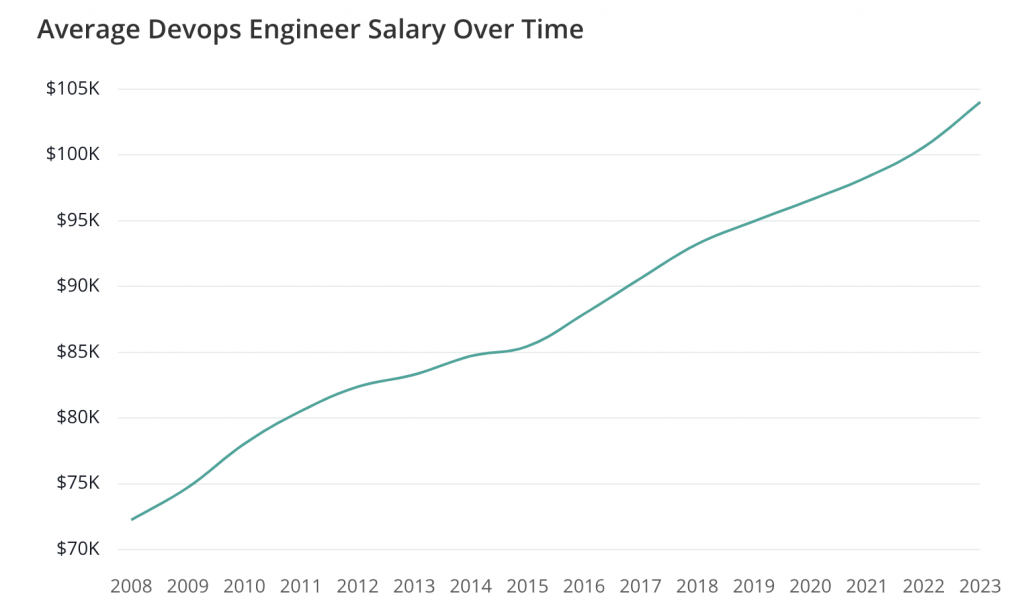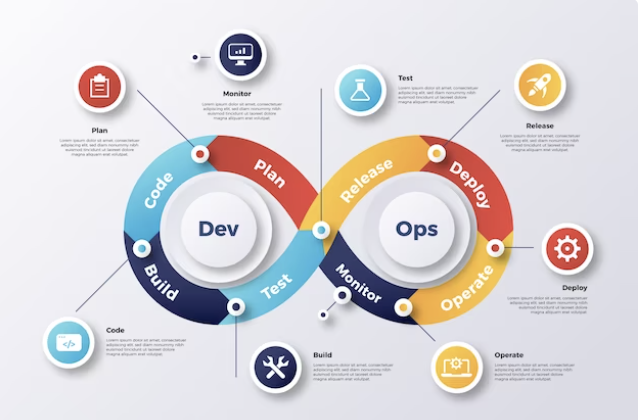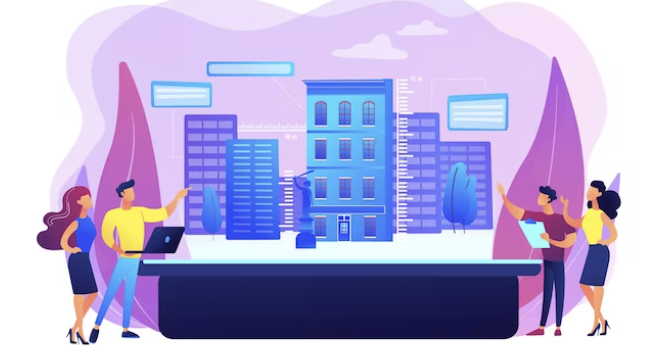Introduction
In the ever-evolving landscape of software development and IT operations, the rise of DevOps has been nothing short of revolutionary. DevOps, a set of practices that emphasize collaboration between development and operations teams, has reshaped the way organizations deliver software and services. But, as the technology ecosystem continues to evolve, a critical question arises: Are DevOps developers still in demand in the USA? This article explores the current state of DevOps demand, the roles and responsibilities of DevOps engineers, the tools they use, their skill set, and what the future holds for this dynamic field.
Are DevOps Engineers in Demand?

Source: DevOps Trends 2023
In the rapidly evolving landscape of technology and software development, DevOps has emerged as a game-changer. But what’s equally important is the demand for skilled DevOps engineers who can navigate the complexities of modern software projects. In this chapter, we’ll explore the current state of demand for DevOps engineers in the USA and the factors driving this demand.
Factors Driving the Demand for DevOps Engineers

Agile Practices:
The widespread adoption of agile practices in software development has accelerated the need for DevOps. DevOps principles align seamlessly with agile methodologies, emphasizing collaboration, quick iterations, and continuous improvement.Cloud Computing:
Cloud services like AWS, Azure, and Google Cloud have revolutionized infrastructure management. DevOps engineers proficient in cloud technologies are essential for optimizing cloud resources and ensuring scalability.Automation:
The push for automation in software development and operations is a driving force. DevOps engineers automate manual tasks, enabling faster and more reliable software delivery.Microservices and Containers:
The rise of microservices architecture and containerization (e.g., Docker, Kubernetes) has created complex environments. DevOps expertise is crucial for managing and orchestrating these components.Cybersecurity:
Security is paramount in today’s digital landscape. DevOps engineers who can integrate security practices into the development pipeline are in high demand.Cost Efficiency:
Companies recognize that DevOps practices can lead to cost savings by optimizing resources and reducing downtime.Competitive Advantage:
Staying competitive requires delivering high-quality software quickly. DevOps enables rapid development and deployment, giving companies an edge in the market.
Key Roles and Responsibilities of a DevOps Engineer
To truly understand the demand for DevOps engineers in the USA, it’s essential to explore the roles and responsibilities they undertake in the realm of modern software development and operations. In this chapter, we’ll delve into the core responsibilities of DevOps engineers and how they contribute to project efficiency and innovation.

Defining the DevOps Engineer’s Role
DevOps engineers are the architects of seamless collaboration between development and operations teams. They break down traditional silos and introduce a culture of automation, continuous integration, and rapid deployment. Here are their core responsibilities:
Automation and Continuous Integration/Continuous Deployment (CI/CD):
DevOps engineers design, implement, and manage CI/CD pipelines. These pipelines automate code integration, testing, and deployment, resulting in faster and more reliable releases.Infrastructure Management:
Whether it’s on-premises servers or cloud-based resources (AWS, Azure, Google Cloud), DevOps engineers optimize and manage infrastructure. They ensure it’s scalable and supports the application’s needs.Monitoring and Incident Response:
Proactive monitoring is a DevOps hallmark. Engineers continuously monitor system performance, analyze logs, and set up alerts to detect anomalies. When incidents occur, they respond swiftly, troubleshoot, and implement solutions to minimize downtime.Collaboration Facilitation:
DevOps engineers foster collaboration between development and operations teams. They facilitate communication, streamline workflows, and ensure both sides work together efficiently.
Core Responsibilities in Software Development and Operations
DevOps engineers bring a unique blend of skills and responsibilities to the table. Here’s how their roles contribute to project efficiency and innovation:
Efficiency Through Automation:
By automating manual tasks and streamlining processes, DevOps engineers increase efficiency. This results in shorter development cycles and quicker time-to-market for software.Enhanced Collaboration:
Siloed departments can hinder progress. DevOps engineers break down these barriers, fostering cross-functional teamwork that leads to innovation.Reliability and Stability:
Through infrastructure management and proactive monitoring, DevOps engineers ensure system reliability. This stability allows development teams to focus on innovation rather than firefighting.Continuous Improvement:
DevOps is all about continuous improvement. Engineers identify bottlenecks, analyze data, and implement changes to enhance project performance continually.
DevOps engineers are change agents, driving projects towards success through their automation expertise, infrastructure management, and collaboration skills. Their impact is felt in the efficiency of software development and the ability to innovate with confidence.
Tools Used By a DevOps Engineer
In the world of DevOps, tools are the building blocks of efficiency, automation, and collaboration. DevOps engineers leverage a versatile toolkit to streamline processes, enhance productivity, and ensure seamless integration and deployment of software. In this chapter, we’ll explore the common tools and technologies that DevOps engineers utilize, highlighting their adaptability to diverse tech stacks.

A Toolkit for Efficiency and Automation
DevOps engineers are often referred to as “automation architects” because their role revolves around automating repetitive tasks, eliminating manual interventions, and optimizing workflows. Here are some of the fundamental categories of tools used by DevOps professionals:
Version Control Systems (VCS):
VCS like Git, Mercurial, and Subversion are at the core of collaborative software development. DevOps engineers use these tools to manage and track changes in source code, ensuring version control and collaboration.Continuous Integration/Continuous Deployment (CI/CD) Tools:
CI/CD tools like Jenkins, Travis CI, and CircleCI automate the building, testing, and deployment of software. DevOps engineers set up and configure these pipelines to ensure code changes are thoroughly tested and seamlessly deployed.Configuration Management Tools:
Tools such as Ansible, Puppet, and Chef enable DevOps engineers to automate and manage system configurations. They use these tools to ensure that servers and infrastructure are consistent and reproducible.Containerization and Orchestration Tools:
Containers, facilitated by Docker, have revolutionized software deployment. Kubernetes, Docker Swarm, and Amazon ECS are container orchestration tools that DevOps engineers use to manage and orchestrate containerized applications and microservices.Cloud Services:
With the rise of cloud computing, DevOps engineers frequently work with cloud platforms like Amazon Web Services (AWS), Microsoft Azure, and Google Cloud Platform (GCP). They use these platforms to provision and manage resources, leverage infrastructure as code (IAC) practices, and ensure scalability.Monitoring and Logging Tools:
DevOps engineers rely on monitoring tools like Prometheus, Grafana, and Nagios to continuously assess system performance. Logging tools such as ELK Stack (Elasticsearch, Logstash, Kibana) help them collect and analyze log data for troubleshooting and optimization.Collaboration and Communication Tools:
Effective communication is key in DevOps. Tools like Slack, Microsoft Teams, and Atlassian’s Confluence and JIRA enhance collaboration among development and operations teams.Security Scanning and Compliance Tools:
Security is a paramount concern. DevOps engineers use tools like OWASP ZAP and Nessus for vulnerability scanning and compliance checks, ensuring the security of software and infrastructure.
Common Programming Languages:
While not tools in the traditional sense, programming languages like Python, Ruby, and Shell scripting are essential skills for DevOps engineers. They use these languages to write automation scripts, create custom solutions, and integrate tools.
Adaptability to Diverse Tech Stacks:
One of the remarkable qualities of DevOps engineers is their adaptability to diverse tech stacks. Whether you’re working with a Java-based application, a Node.js server, or a database-driven system, DevOps principles and tools can be applied effectively.
DevOps Engineer Skill Set

In the dynamic world of DevOps, a diverse skill set is the linchpin that enables DevOps engineers to bridge the gap between development and operations successfully. Beyond technical proficiency, DevOps engineers possess a unique combination of soft skills that make them invaluable assets in the realm of software development and operations. In this chapter, we’ll delve into the essential skills that define a DevOps engineer’s profile.
Analyzing the Essential Skill Set
DevOps engineers are known for their versatility, and their skill set reflects this adaptability. Let’s explore the core skills that make DevOps professionals indispensable:
Scripting and Coding Skills:
Proficiency in scripting languages like Python, Ruby, and Shell is paramount for DevOps engineers. These languages empower them to write automation scripts, create custom solutions, and integrate tools seamlessly.Configuration Management:
Tools like Ansible, Puppet, and Chef are staples in a DevOps engineer’s toolkit. They use these tools to automate and manage system configurations, ensuring consistency and reproducibility.Containerization and Orchestration:
With the rise of containerization technologies like Docker and orchestration platforms like Kubernetes, DevOps engineers must possess expertise in managing containerized applications and microservices.Cloud Computing:
Many modern projects leverage cloud platforms like AWS, Azure, or Google Cloud. Familiarity with these platforms, including infrastructure as code (IAC) practices, is essential for DevOps engineers.Collaboration Tools:
Proficiency in collaboration tools such as Slack, JIRA, Confluence, and version control systems like Git enables effective communication, project management, and code collaboration.Security Awareness:
DevOps engineers must understand security best practices to embed security throughout the development lifecycle. This includes securing code, containers, and infrastructure.Problem-Solving Prowess:
Rapid troubleshooting and problem resolution are key skills. DevOps engineers are adept at identifying issues, diagnosing root causes, and implementing solutions to minimize disruptions.
Technical Proficiency and Soft Skills
While technical skills are foundational, soft skills are equally vital for DevOps engineers:
- Effective Communication: DevOps engineers act as bridges between development and operations teams. Effective communication is essential for conveying ideas, addressing concerns, and fostering collaboration.
- Teamwork and Collaboration: DevOps emphasizes breaking down silos. DevOps engineers are team players who work closely with developers, operations staff, and other stakeholders to achieve common goals.
- Adaptability: The technology landscape evolves rapidly. DevOps engineers must adapt to new tools, practices, and industry trends to remain effective.
- Critical Thinking: DevOps engineers are problem solvers. They analyze complex issues, identify root causes, and devise innovative solutions to improve processes and system performance.
- Continuous Learning: DevOps engineers are committed to continuous learning. They stay updated on emerging tools, practices, and technologies to remain at the forefront of their field.
- Strategic Thinking: DevOps engineers align their efforts with overall business goals and objectives. This strategic perspective ensures that DevOps practices drive tangible value for the organization.
The combination of technical proficiency and soft skills makes DevOps engineers versatile professionals who can navigate the complex landscape of software development and operations. They excel not only in automating processes but also in fostering collaboration, innovation, and problem-solving.
Also read: A Beginner’s Guide to DevOps: Understanding, Implementing, and Thriving – US Guide
DevOps Engineer Salary in the US (For Freshers and Experienced Professionals)

Salary is a significant factor that reflects the demand for DevOps engineers in the USA. As organizations increasingly recognize the value of DevOps practices, the compensation for skilled professionals has become competitive. In this chapter, we’ll delve into the DevOps engineer salary landscape, considering both freshers and experienced professionals.
Salary Trends for Freshers
For fresh graduates and those entering the field of DevOps, salaries are attractive. Entry-level DevOps engineers in the USA can expect competitive compensation packages that reflect the demand for their skills. The average starting salary for freshers typically ranges from $80,000 to $110,000 per year.
Factors Influencing DevOps Engineer Salaries
Several factors influence the salary of DevOps engineers:
Experience:
The level of experience significantly impacts salaries. Junior DevOps engineers with one to three years of experience earn less than their mid-level and senior counterparts.Location:
Salary levels vary across different regions of the USA. Metropolitan areas with a high cost of living tend to offer higher salaries to compensate for expenses.Company Size:
Large corporations and tech giants often offer higher salaries compared to smaller companies and startups.Industry:
The industry in which a DevOps engineer works can also affect compensation. For instance, the finance and healthcare sectors may offer higher salaries due to the complexity of their systems and regulatory requirements.Certifications:
Holding relevant certifications, such as AWS Certified DevOps Engineer or Certified Kubernetes Administrator, can positively impact salary negotiations.
A Comparative Look at Compensation
Junior DevOps Engineer (1-3 years of experience): The salary for junior DevOps engineers typically ranges from $80,000 to $110,000 per year.
Mid-Level DevOps Engineer (4-6 years of experience): Mid-level professionals can expect salaries ranging from $110,000 to $140,000 annually.
Senior DevOps Engineer (7+ years of experience): Senior DevOps engineers with extensive experience can command salaries upwards of $140,000 per year, with the potential for six-figure bonuses.
It’s essential to note that these figures are approximate and can vary based on individual circumstances, negotiation skills, and specific job requirements. DevOps engineers are well-compensated, reflecting their role’s significance in driving innovation and efficiency in software development and operations.
The Best Cities for DevOps Jobs in the US

When considering a career in DevOps, the choice of location can significantly impact job opportunities and overall quality of life. In this chapter, we’ll explore some of the best cities in the USA for DevOps jobs, taking into account factors that make them attractive destinations for DevOps professionals.
1. San Francisco, California:
Known as the tech capital of the world, San Francisco boasts a thriving tech industry, including numerous startups and tech giants. The city offers a high demand for DevOps engineers, competitive salaries, and a vibrant tech community.2. Seattle, Washington:
Home to tech giants like Amazon and Microsoft, Seattle is a hub for technology and innovation. The city offers a strong job market for DevOps professionals and a high quality of life.3. Austin, Texas:
Austin has emerged as a tech hotspot, attracting companies and professionals alike. It offers a lower cost of living compared to Silicon Valley and a growing demand for DevOps talent.4. New York City, New York:
NYC is a global business and technology hub, offering a diverse range of DevOps opportunities in various industries. It also provides access to a rich cultural scene.5. Boston, Massachusetts:
With its strong educational institutions and a growing tech scene, Boston offers DevOps professionals opportunities in sectors like healthcare, finance, and education.6. Raleigh-Durham, North Carolina:
The Research Triangle Park area in North Carolina has seen significant tech growth. It’s known for its favorable business climate and demand for DevOps expertise.7. Denver, Colorado:
Denver combines a strong tech sector with a high quality of life and outdoor recreational opportunities. The city has a growing demand for DevOps engineers.8. Atlanta, Georgia:
Atlanta’s diverse economy includes tech companies, finance, and logistics. It offers a lower cost of living than some tech hubs and an emerging tech scene.9. Chicago, Illinois:
Chicago’s business landscape extends to technology, offering DevOps professionals opportunities in various industries, including finance, healthcare, and transportation.10. Portland, Oregon:
Known for its tech-friendly environment, Portland offers a balance between work and lifestyle, with opportunities in tech companies and startups.
Factors That Make Cities Ideal for DevOps Professionals

Several factors contribute to a city’s attractiveness for DevOps professionals:
Job Opportunities:
A city with a robust tech sector and a high concentration of tech companies is likely to have more DevOps job openings.Quality of Life:
Consider factors like cost of living, climate, recreational activities, and cultural offerings that impact your overall quality of life.Tech Community:
Cities with active tech communities often provide networking opportunities, conferences, and meetups that can enhance your professional growth.Salary Levels:
Compare average salaries in your field for different cities, considering factors like the cost of living.Industry Specialization:
Some cities may specialize in specific industries, such as finance or healthcare, offering DevOps roles tailored to those sectors.Growth Potential:
Consider the long-term outlook for tech growth in a city, as it may affect your career advancement opportunities.
When choosing a city for your DevOps career, it’s essential to align your preferences and priorities with the unique characteristics of each location. Whether you prioritize a vibrant tech scene, work-life balance, or specific industry opportunities, there’s likely a city that suits your career aspirations.
Current Demand for DevOps Developers in the USA

In the rapidly evolving landscape of software development, DevOps has emerged as a pivotal discipline bridging the gap between traditional software development and IT operations. DevOps developers, with their unique skill set and expertise, have become indispensable assets for organizations across the United States.
State of DevOps Developer Demand
As we step into the present, the demand for DevOps developers in the USA remains exceptionally high. This demand is not a fleeting trend but a reflection of the fundamental shift in the way businesses approach software delivery and operations. DevOps developers are at the forefront of this transformation, and their role is more critical than ever before.
Statistics and Data on Job Postings and Market Trends
The numbers speak volumes. Job postings for DevOps developers continue to surge, with organizations actively seeking professionals who can streamline their development pipelines, improve efficiency, and enhance the quality of their software products. According to industry reports and job market analysis, DevOps-related roles consistently rank among the top in-demand positions in the tech industry. These roles encompass a wide range of titles, from DevOps Engineer to Site Reliability Engineer (SRE), reflecting the diversity of responsibilities within the DevOps domain.
Factors Driving the Ongoing Demand for DevOps Developers
Several factors contribute to the sustained and growing demand for DevOps developers in the USA:
Digital Transformation:
Organizations are racing to digitize their operations and deliver digital experiences to customers. DevOps is at the heart of this transformation, enabling businesses to rapidly develop, test, and deploy software solutions.Cloud Adoption:
The shift to cloud computing continues to gain momentum. DevOps developers who are well-versed in cloud platforms like AWS, Azure, and Google Cloud are in high demand to manage and optimize cloud-based infrastructures.Automation Imperative:
Automation is a core principle of DevOps, and it is now a strategic imperative for businesses. DevOps developers who can automate workflows, infrastructure provisioning, and testing processes are invaluable assets.Security Integration:
Security is no longer an afterthought; it’s an integral part of DevOps practices. DevSecOps, which blends security into the development pipeline, necessitates professionals who can bridge the gap between security and development.Competitive Advantage:
In today’s competitive landscape, organizations recognize that DevOps can give them a competitive advantage. Businesses that can release high-quality software faster are better positioned to meet customer demands and outperform their rivals.
Also read: How to Stay Up-to-Date on the Latest DevOps Trends in the USA
Conclusion
In this comprehensive guide to DevOps careers in the USA, we’ve navigated the dynamic landscape of software development and operations, exploring the demand for DevOps engineers, emerging trends, and pathways to success. DevOps professionals play a pivotal role in accelerating software delivery, enhancing quality, and fostering collaboration. The future of DevOps careers is bright, driven by increased adoption, the integration of security practices, and the rise of cloud-native and AI-driven technologies. Aspiring DevOps professionals are encouraged to acquire technical skills, pursue continuous learning, and build a strong professional network. With adaptability and innovation at its core, the DevOps journey promises exciting opportunities and the chance to shape the future of software development and operations.


















